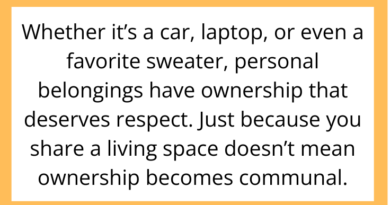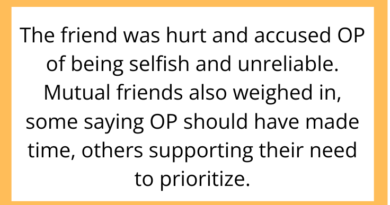AITAH for Telling My Friend to Cancel Her Baby Shower Because I Don’t Like Big Gatherings?
Have you ever found yourself caught between wanting to support a friend and sticking to your own comfort zone? This exact dilemma recently came up in a popular r/AITAH post that sparked an intense discussion on boundaries, friendship, and social anxiety. The poster asked if they were the bad person for telling their close friend to cancel her baby shower because they don’t like large social gatherings.
In this blog post, we’ll break down the situation, analyze both sides of the story, and explore why balancing personal limits with social expectations can sometimes cause real tension.
The Baby Shower Controversy: What Happened?

The OP explained that their friend had been planning a big baby shower with around 30 guests. OP suffers from social anxiety and feels overwhelmed in large crowds. They confided in their friend, asking if it was possible to make the event smaller or postpone it to a time when OP might feel more comfortable. When the friend refused and insisted the shower stay as planned, OP bluntly told them to cancel it if it couldn’t be adjusted.
This bluntness triggered backlash. The friend felt hurt and accused OP of being selfish and unsupportive. Meanwhile, OP felt misunderstood, believing they were simply setting a boundary to protect their mental health.
Why Setting Boundaries Matters in Friendships

Respecting Personal Limits
It’s important to recognize that everyone has different comfort zones. While some people thrive in social settings, others find large gatherings draining or anxiety-inducing. Setting clear boundaries helps maintain mental wellbeing, which is crucial for healthy relationships.
Communicating with Empathy
The clash here highlights how important it is to communicate boundaries empathetically. Instead of demanding cancellation, suggesting alternatives or compromises could help both parties feel heard and respected. For example, proposing a smaller, more intimate gathering or a virtual baby shower might be a middle ground.
When Does Saying “No” Become Selfish?

Balancing Needs vs. Support
It’s natural to want to support close friends during milestone events. However, support doesn’t mean sacrificing your own health or well-being. The key lies in balancing your needs with showing up in a way that feels manageable.
Understanding Emotional Impact
On the other side, the friend’s feelings are valid. Planning big events requires effort, and last-minute changes can be stressful. Recognizing this emotional labor can help create compassion for their perspective while maintaining your own boundaries.
Lessons from This AITAH Scenario

-
Set boundaries early: Openly discuss your comfort levels well before the event to avoid misunderstandings.
-
Offer alternatives: Suggest ways to support your friend that don’t trigger your anxiety.
-
Practice empathy: Acknowledge the effort your friend is putting into the event while expressing your feelings honestly but kindly.
-
Know your limits: It’s okay to say no if attending harms your mental health — true friends will understand.
Final Thoughts

Navigating friendships and social expectations can be tricky, especially when mental health is involved. This AITAH scenario teaches us that setting personal boundaries isn’t inherently selfish — it’s an act of self-care that, when communicated thoughtfully, strengthens relationships.



